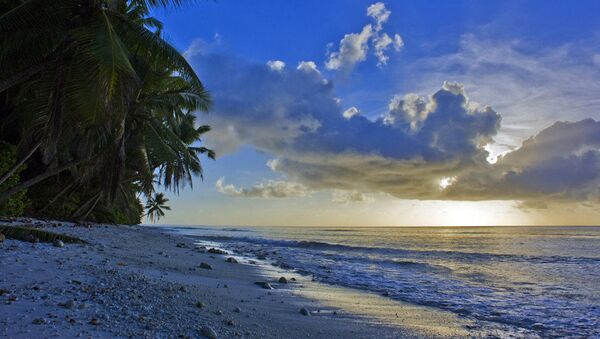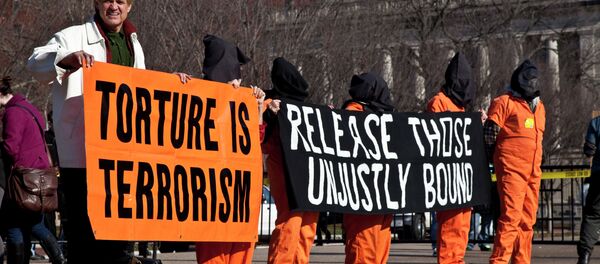When questioned in the House of Commons about the government's progress on a decision for resettlement of the islands, Secretary of State William Hague refused to speculate on a time frame, despite saying that the possible resettlement was being considered "at the highest level."
"I don't think I can guarantee to you there will be a statement about that before the dissolution of Parliament given that we've nearly already arrived at dissolution," he said.
A quick history of injustices suffered by the Chagossian people http://t.co/72WX0nvfA2 and what we can do about it http://t.co/msVNEBiSvS
— UK Chagos Support (@ChagosUK) January 9, 2015
The forced removal of the native Chagossian population from the Chagos Islands — a group of small, isolated islands in the middle of the Indian Ocean — is considered to be a huge, unsolved blight on the UK's human rights record.
At the height of the Cold War, between 1967 and 1973, the estimated 1,500 to 1,800 Chagossians were forcibly removed from the islands, later renamed British Indian Ocean Territory (BIOT), to make way for the construction of a US military base on the archipelago's largest island Diego Garcia.
'Savage' Americans
Chagossian Bernadette Dugasse was only 2 and a half when she and her family were forced from Diego Garcia in 1958, after her father was involved in an ongoing dispute with the island's authorities.
And while Bernadette has little or no memory of her time in Diego Garcia, many of her family members who stayed on the island until 1972 described the "horrible" treatment they received by the American servicemen stationed in the Chagos archipelago.
"The later batches of Americans that landed on Diego Garcia were savages."
"They would go to the local people's houses with the island manager and would just tell people they had to get out. They didn't care if people were sick, pregnant or whatever," she said.
Bernadette says that they also employed cruel and frightening intimidation tactics to try and force the remaining islanders to leave.
"To make the situation worse and to scare people, they gassed our pets in front of all of the kids. When the people saw that, they were scared for their lives and for the lives of their kids so they then decided to go."
There were reports of far greater acts of violence committed by American officials, with claims some Chagossians were beaten and threatened with death if they did not cooperate and leave the islands.
@MrMalky @RikkiD64 'twas ever thus…. #Chagos Chagos; Great Britain's Very Dirty Cleansing: http://t.co/smKkxrVRJX
— scottish matters (@ochayethenews) March 10, 2015
After leaving Diego Garcia, Bernadette and her family moved to the Seychelles, where she lived for 40 years, before moving to the UK ten years ago.
A stream of Chagossians have since moved to Britain, with estimates suggesting there are about 3,000 Chagos Islander descendents living in the country, with the largest community around Crawley, south of London. However, many of these people were not born in the Chagos Islands and have since never been able to visit.
Despite close to 50 years in exile, the Chagossian community in the UK, along with other groups in Mauritius, have continued to campaign for their rights to return to the Chagos Islands permanently, by raising awareness of their situation and calling on British MPs to address the issue.
A Question of Feasibility
A considerable amount of the increased momentum behind the push for resettlement of the Chagos Islands has been put down to the release of a government-commissioned independent report looking into the "feasibility" of resettling the islands.
The study, release last month by auditors KPMG, weighed up three different options for resettlement — a large scale resettlement for 1,500 people, a medium scale project for 500, and a small pilot programme for 150 people.
Despite some disagreements over what option would be the most suitable, Chagossian campaigners were generally pleased to see that the report found that there was no real reason not to let the Chagossians return. And this is what had given Chagos Islanders and campaigners hope that the current Conservatives/Lib-Dems government would honour their promise on resettlement.
Veteran British diplomat David Snoxell, who has dealt with issues relating to the Chagos Islanders for close to 40 years, and who is the coordinator for an all-party parliamentary group (AAPG) on the matter, was among those hopeful that a decision would be made sooner rather than later.
He said the government's pledge, along with the 50th anniversary of the creation of the BIOT would have made 2015 an "auspicious year in which to wipe out this stain on the UK's human rights record," which he has described as:
"One of the worst violations of fundamental human rights perpetrated by the UK in the twentieth century."
Diego Garcia and CIA Rendition
However, in another damning human rights concern for the British government, the island of Diego Garcia has also been caught up in allegations that American authorities used the island to interrogate terror suspects as part of the CIA's post 9/11 torture and rendition programme.
Lawrence Wilkerson, a senior US official during the Bush administration, revealed in an interview to Vice News in January that, according to his sources, the island was used as "a transit site where people were temporarily housed, let us say, and interrogated from time to time."
These explosive claims contradict the British government's official line on Diego Garcia and CIA involvement, which states that CIA planes carrying torture suspects twice landed on the island in 2002 for refuelling, however none of the suspects were released from the plane.
However, these latest claims have led to increased calls for the British government to put an end to the American military's use of Diego Garcia as a base, as the current agreement is set to expire in 2016, unless it is re-negotiated between Westminster and Washington.
Time to go home: What are the chances?
It seems the opinion on whether the Chagos Islanders will be given the right to return is also split within the Chagossian community.
Sabrina Jean is a second-generation Chagossian who lives in Crawley, West Sussex. She has been vocal in gathering the concerns of the local community in the UK and had previously been quite optimistic that a decision would be made on resettlement, particularly in light of the findings of the 'feasibility' report. She said:
"I have been fighting for my right, and the Chagossian right to return home. I'm confident that some sort of settlement will take place. The UK government and the US government need to do whatever they can to let the Chagossian people return home. We want to return home and we are ready."
Fellow Chagossian Bernadette Dugasse is now much less optimistic about a groundbreaking decision being made, however this hasn't stopped her determination to one day return to the place where she was born.
Bernadette was lucky enough to take part in a trip to return to Diego Garcia in 2011 for a nine-day visit as part of a special trip that was organised by government authorities, something she will always treasure.
"When I opened my eyes I knew that was where I belong."
"If we can go back to live it will be as if God has listened to my prayers," she said.






